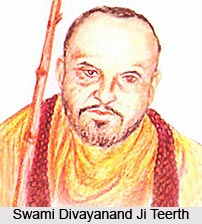 Shankaracharya Swami Divayanand Ji Teerth is an Indian saint who is known for spreading the principles of Sanatan Dharma. He was born on 4th January 1955 in a village called Noksan in the district of Tuensan in Nagaland. At the age of twenty seven he renounced home and moved from one place to another to meet saints and absorb knowledge. One of the great saints in India, his holiness Harishwaranand Teerth initiated Swami Divayanand Ji Teerth to `Sanyasa` at Chitrakoot. The Brahmleen Swami Ram Ashram Ji Maharaj installed Swami Divayanand Ji Teerth as the Shankaracharya of Bhanpura in the year of 1989 and he was also installed as the Shankaracharya of the Holy peeth, later. He also established four monasteries in the four corners of India and the Bhanpura Peeth is most popular amongst them.
Shankaracharya Swami Divayanand Ji Teerth is an Indian saint who is known for spreading the principles of Sanatan Dharma. He was born on 4th January 1955 in a village called Noksan in the district of Tuensan in Nagaland. At the age of twenty seven he renounced home and moved from one place to another to meet saints and absorb knowledge. One of the great saints in India, his holiness Harishwaranand Teerth initiated Swami Divayanand Ji Teerth to `Sanyasa` at Chitrakoot. The Brahmleen Swami Ram Ashram Ji Maharaj installed Swami Divayanand Ji Teerth as the Shankaracharya of Bhanpura in the year of 1989 and he was also installed as the Shankaracharya of the Holy peeth, later. He also established four monasteries in the four corners of India and the Bhanpura Peeth is most popular amongst them.
This article is a stub. You can enrich by adding more information to it. Send your Write Up to content@indianetzone.com




















